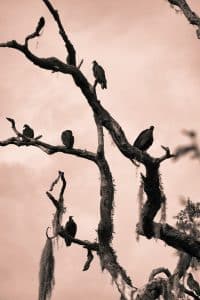Greetings and salutations, Apparition Lit Readers and Submitters!
Welcome to our next installment of interviews with our amazing guest editors! Premee Mohamed and Tiffany Morris have led us into this series, and today I am happy to bring you a Q&A with our latest and greatest guest editor, Aigner Loren Wilson. We are fresh off the successful reveal of our Contamination issue, and there’s no better time to recognize Aigner’s talents and contributions.
Please read on to learn about the many, MANY projects Aigner has going on right now; her philosophy on why it’s important to support other writers; insights into audio dramas and Africanfuturism; and a vague threat about who she thinks will win the vampire vs lycan war…
Q: I like to start with a general question: What was your experience like working with Apparition Lit? In your edition, what pieces in the TOC were you most excited about and why? What would you want our readers to know about how we choose our TOC?
A: It was a pretty awesome experience! Apparition Lit was the first publication to reach out to be about guest-editing an issue, and it meant so much to have that opportunity. The actual work I’m still processing and reflecting on. Y’all showed me how an editorial team can work and decide as a group.
And that’s the main thing I’d want readers to know. These stories weren’t chosen solely by me as the guest editor. The TOC was a team effort, and I think a lot of times that isn’t how it’s done at pubs, or at least, it’s not how readers and writers see it done at pubs.
All the pieces made me excited in many different ways, but ‘God Maker’s Cure’ by December Cuccaro and ‘I Wear My Spiders in Remembrance of Myself’ by Kel Coleman are ones that make my reader’s heart very happy, especially Coleman’s. I love how the piece came in and how they developed it throughout the process.
Q: In addition to publishing your own work, you also work in the realm of teaching others and supporting other authors to develop their craft. You host a range of classes and opportunities on Starburst School For Writers and make other resources available that seem (to me) you really advocate for other writers to be their best selves. How do you find the energy and motivation to teach others while also working on your own pieces? How do you measure success with your pupils?
A: To be honest, I don’t really know where the energy comes from, but the motivation is super simple. I’ve worked with and met a lot of writers and people who want to be writers who don’t believe in themselves, don’t have the support of those around them, or who can’t connect the dots when it comes to the writing craft.
I was, and still am, one of those writers at times. There are lots of things about writing I’m still learning and coming to understand. The only way I can get to those next levels in my career and craft is by someone who’s been there willing to show me the way. That’s what I want to be for other writers and I want to encourage them to do the same.
The main thing I always stress with writers I work with, and really anyone in my life, is that no one can measure their success. Know your intention, what you want to accomplish, and what will make you feel successful or happy. For some of the people I work with, it’s writing a story they can be proud of. In other cases, it’s all about making that dream sale, landing that article assignment, or finally understanding some element in their craft.
If I can help or show a writer how to hit that wonderful spark of accomplishing something they set out to do, it’s a success in my book.
Q: Dead Children Stop Playing for Ungrateful Audiences was really enjoyable. I both love horror and to laugh, and this piece is a perfect example of how to find the balance between something that is mournful and dark, outlandish humor. Writing humor is a true skill that many authors (including myself) miss the mark on. How do you go about striking the balance between “funny” and “scary” in your work? What tips do you have for fellow writers for finding that sweet spot?
A: It took a bit of thinking on this to articulate the funny in the dark, and, for me, at least, it all comes down to pacing, timing, and connecting the humor to the story. I don’t focus on making jokes so much as finding the spots where the tension or timing is just right for a well-placed line or action. In real life, I’m comedic, humorous, extremely dry and sarcastic, so it shows up easily in my writing. For that story in particular, it came to me, humor and all, without much effort.
I don’t have any tips, really. I think that’s why I haven’t talked much about it before. When in doubt, turn to copy work, though. Find the types of writers who are writing the humor you want to write and write their story word-for-word. Think about what conscious decisions the author made. If there are stylistic choices that you don’t agree with, explore how changing it would change the story. Does it still have the same effect on you as a reader?
Really dig into what makes the story humorous. Then rewrite it how you would tell it. What is lost and what is gained?
To get better, you gotta examine and practice.
Q: You wrote a wonderful piece for Tor.com about Africanfuturism. [For our readers, that’s not a typo; check out the piece above, or this guide, for Aigner’s full explanation on where Africanfuturism deviates from Afrofuturism. Seriously, Aigner does the work for you!]. Your article summarizes the lack of recognition in the nuance of Black literature, and eloquently describes the ways in which Africanfuturism transcends the diaspora. How can publication editors, such as those of us at Apparition Lit, do more of the heavy lifting of accurately identifying these works and advocating for their presence in the spec fic community? And where do you see this discourse playing into the larger issue of lack of diversity in the mainstream spec fic markets?
A: Such a big question! I always want to start by telling people to go to the source. Nnedi Okorafor is the author who coined the term and defined what it means.
I think the heavy lifting on publication editors’ parts really comes down to not only finding the spaces where African and Africanfuturist authors are writing, publishing, and gathering, but connecting with the writers within those communities and helping them set up their own publications and spaces to showcase the work of the community.
Learn from how people writing Africanfuturism are identifying their work. Not every African author will identify with the term and not every writer of Africanfuturism will be African. Give opportunities to writers who do identify as Africanfuturist writers to not only showcase their own work but to serve editorial roles.
But like with community building in general, always keep the focus on the needs of the community and let them dictate where support is placed and how.
Q: I learned a lot about podcasts just by taking a quick look @Discover_Pods. I’m a big fan of podcasts, but I have yet to make the jump to story-telling podcasts. You have a really unique and expansive feature titled “Radio at the end of the world” where you regularly highlight picks of radio dramas and stories. Where do you find the intersection between your writing and what you listen to? And where would you recommend Apparition Lit readers start to make the jump to audio fiction?
A: Oh god, I really love audio drama and fiction. My first stories ‘Dead Children Stop Playing for Ungrateful Audiences’ and ‘Unwanteds’ were audio fictions published by NIGHTLIGHT, which is a great place to start for people who want to hear the best Black contemporary horror writers out there. Back when I worked in retail, usually back of the store, I used a huge majority of my time to listen to audio drama/audio fiction podcasts.
They helped me get a grasp on writing. I’d spend days just listening to Clarkesworld Magazine’s Podcast or Beneath Ceaseless Skies Podcast and feel like I was taking a masterclass in speculative writing. Podcasts, both audio dramas and nonfiction ones like Writing Excuses, have helped me write better and really make sense of this whole craft business.
Any of the podcasts I’ve listed above would be great ones to check out for people interested.
Q: It is a nearly universal truth that spec fic writers are either of the werewolf clan or vampire brood. In our editor slack, you revealed yourself to be a werewolf. While I am unequivocally of the vampire ilk, I respect your choice and consider your time with Apparition Lit to be evidence that our two worlds can come together in peace. How did you choose your side in such a controversy? And, when we are inevitably forced to battle, who else do you believe will be on your team?
A: Like many werewolves, I didn’t choose my side, it found me, and left traces in my blood. I’m not one for outing my kin, so I’ll just say: our numbers are many.
Q: Last but not least, where do you want to be found online?
A: So many places.
Twitter @alwlikeahowl, Instagram @frekihowl (seeing a theme here?), Medium @aignerloren
Websites: Byline or By Crook, My bizness site: Haus of Three Crows
Thank you to Aigner for her talents (and even her contribution to our playlist)!
Until next time, friends!
Blog Photo by Thomas Bonometti on Unsplash
-
 Marie Baca Villa Blogger/Submission Reader
Marie Baca Villa Blogger/Submission ReaderMarie Baca Villa is a Chicana writer and artist in California. She has a master’s degree in psychology and used her education to build a long career in crime victim advocacy. As a fan of speculative fiction, she loves anything involving strange worlds, complex characters, and unexplained phenomenon. She’s a bonified cat lady, covered in tattoos, and she loves cussing, beer, and flaming hot cheetos. You can find Marie on Twitter @okay_its_marie





